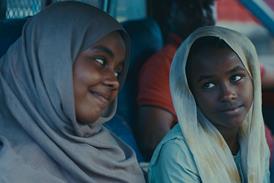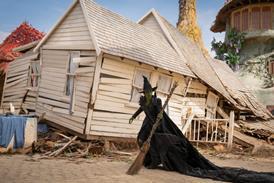Pedro Almodovar's 17th feature, Broken Embraces, has been poorly received by Spanish critics and opening weekend figures have suffered. But is the territory's most famous auteur critic-proof' Barry Byrne looks at the evidence.
At the end of Pedro Almodovar's Broken Embraces, blind movie director Mateo Blanco (played by Lluis Homar) tells the audience films have to be completed, they must come to an end. The end couldn't have come too soon for a significant sample of leading Spanish critics who have trounced the director's 17th feature in a series of vitriolic reviews that, judging from disappointing opening weekend figures, have made a dent on its local box-office returns.
'What you see and what you hear sounds like satisfied mental masturbation,' wrote Carlos Boyero, the star critic for Spain's leading daily El Pais in his piece entitled What Have I Done To Deserve This' after Almodovar's 1984 comedy. Though he devotes just three of his eight paragraphs to the film - the rest is a bitter rumination on Almodovar's career - the review has sparked a wider debate, echoed across the press and throughout the blogosphere, on whether the moment has come to call time on Spain's at times turbulent affair with the Oscar-winning director.
The result was an unspectacular opening weekend, with Broken Embraces going out on 240 screens for a $1.3m three-day weekend gross ($1.9m including previews), $1m less than Volver's 2007 opening and behind Clint Eastwood's Gran Torino in its third week.
These opening numbers largely come from Almodovar's die-hard fans in Spain, now aged 35 to 50, who shared the country's post-Franco 'movida' with him and grew up with his outrageous comedies. Now the question remains as to whether Broken Embraces will prove critic-proof and draw the second weekend - and after - audiences who are much more vulnerable to word of mouth.
With the international marketplace sewn up thanks to El Deseo's partnerships and Focus Features International and a reported berth in Cannes, Broken Embraces faces a pretty secure future outside Spain. At home, though, audiences and critics like their Pedro to be peppier - All About My Mother was a huge hit at $13m, but the darker Bad Education and Talk To Her dropped down to the $8m mark (see sidebar).
El Pais' Boyero hails 'the splendid Volver', for example, but compares Broken Embraces to the 'insufferable Talk To Her' and the 'grotesque Bad Education', slamming 'the forced dialogues' and pointing out that 'the emotional temperature is lukewarm'. The temperature left many critics chilled. Rodriguez Marchante, in newspaper ABC, said: 'It's a cold film, despite containing a simmering plot and volcanic ideas.'
The critics have a point, but lowering the emotional thermostat was likely to have been Almodovar's intention. Broken Embraces, with its splintered chronology and flashback narrative, is clearly a thrust into noir territory and the director was probably trying to reproduce the dazed, mannequin-like delivery of the noir stars of the 1940s.
This is at odds with Almodovar's trademark jaunty, frothy dialogue, but the conceit itself may have been lost on many viewers, certainly the general public who have rarely, if ever, seen the noir stable in its original language. Generally, Spaniards like their films dubbed rather than daubed with subtitles, and the actors who stood in for the originals more often than not failed to reproduce the minimalist pitch of noir icons.
Take polar sparring partners Alan Ladd and Veronica Lake, for instance, in This Gun For Hire. Dubbing in their dead-voiced repartee was the Spanish actor who also did a turn as Bing Crosby, Charles Aznavour and Pat Boone, among others, while the actress who dubbed Lake also sidelined as Morgan Fairchild in Dallas and Farrah Fawcett in Logan's Run.
The Spanish critics are all too aware this is a foray into noir but, unhappily for the director, this has merely served to draw comparisons with his dark Bad Education, the feature which went down worst with the critics over the past decade, and fared poorly at home with $7.8m (and 8.9% of the total Spanish box office that year, as opposed to Volver's 14.4% in 2006).
But some critics did find virtues. Gustavo Martin Garzo, also writing for El Pais, called Broken Embraces 'daring, beautiful and intense'. And Eduardo Torres-Dulce, writing for Expansion, having trashed the credibility of the dialogue and actors, found something to admire in the 'episodic beauty of some of the scenes which demonstrate the hand of a first-class film-maker'.
But bloggers echoed most of the print critics, slating the film's lack of warmth, unmotivated characters and lacklustre script, with many confused as to what sort of genre it belongs to. Many waxed nostalgic for the director's earlier shambolic, quirky comedies. And though the critics were mostly uneasy with the film-within-the-film conceit - a self-conscious tribute to Women On The Verge Of A Nervous Breakdown - many of those polled by the media leaving the cinema said they'd like to have seen more of old Almodovar.
However - and this will come as small consolation - piracy trackers have reported that Broken Embraces has surged ahead of Hollywood fare and already tops the most-watched lists when it comes to online piracy in Spain (a country which logged 350 million illegal downloads last year).
Most bemused by the fuss, however, was the Xornal de Galicia's contributor. Of course it's the 'usual house-style narcissism ... strained cinematic homages ... second-hand script strategies', he wrote. 'But that's Almodovar. It's bizarre this tsunami of disdain should sweep over the director now, for just doing what he's always done.'
Additional reporting by Chris Evans



















No comments yet